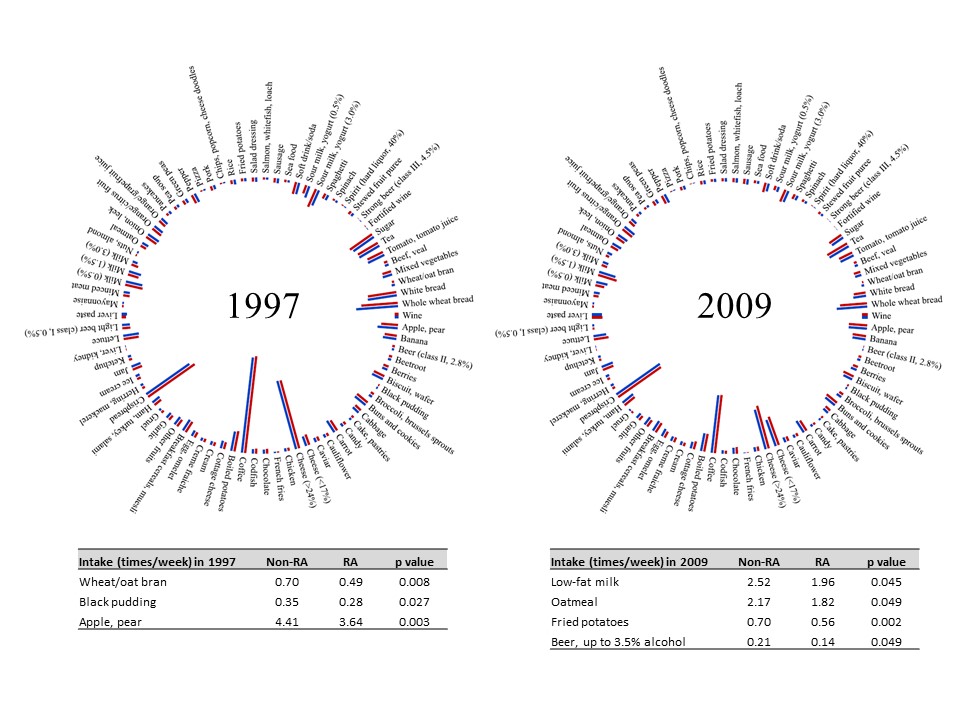Session Information
Session Type: ACR Poster Session A
Session Time: 9:00AM-11:00AM
Background/Purpose:
The interest of dietary factors in rheumatoid arthritis (RA) has increased among researchers and RA patients over the last decade. Although several interventions as well as epidemiological studies of dietary aspects have shown benefits for RA disease course, there is still a lack of specific dietary recommendations for RA. We hypothesized that women who have been diagnosed with RA change their diet in order to improve their disease status. The aim of this study was to investigate the long-term changes in diet after RA diagnosis in Swedish women.
Methods:
This study included primarily 22,007 women from the Swedish Mammography Cohort (SMC). These women were asked to complete two food frequency questionnaires (FFQ), in 1997 and 2009. In 2003, the SMC was linked to the Swedish Rheumatology Quality register (SRQ) and the Outpatient Register in order to track incident RA cases and provide clinical data. During the period from 1997 to 2009, 380 women were diagnosed with RA. Women who did not complete the FFQ in 1997 and/or 2009 were excluded (n=249). Dietary changes after RA diagnosis were analyzed based on the frequency intake of 82 food items in 1997 and 2009, with two approaches; linear mixed models (191 RA cases versus 21,567 non-RA cases) and hierarchical cluster analysis (191 RA cases versus 573 matched controls (non-RA cases)).
Results:
The majority of the 82 food items did not significantly differ in intake between RA and non-RA cases in 1997 and 2009. RA cases had significantly decreased intake of three and four food items in 1997 and 2009, respectively. (Figure)
Results from mixed models showed that the dietary intake changed significantly from 1997 to 2009 for 44 (53.7%) food items in RA cases and 82 (100%) food items in non-RA cases. Both RA and non-RA cases increased/decreased their intake of all the food items in the same manner. Dietary changes between RA and non-RA cases were not significant for 79 (96.3%) food items, the very few significant differences were intake of whole wheat bread, rice and wheat/oat bran. Non-RA cases increased their intake of these three food items more than the RA cases. (Table)
|
|
Times per week 1997→2009 (mean ± SD) |
|
|
|
Food item |
RA (n=191) |
Non-RA (21,567) |
p value |
|
Whole wheat bread |
6.80 ± 0.45 |
7.75 ± 0.04 |
0.037 |
|
Rice |
0.81 ± 0.06 |
0.94 ± 0.01 |
0.034 |
|
Wheat/Oat bran |
0.38 ± 0.11 |
0.62 ± 0.01 |
0.028 |
The hierarchical cluster analysis did not identify any meaningful clusters based on the total intake of all food items which did not allow comparison of dietary pattern changes over time between RA cases and controls.
Conclusion:
This study showed that women who had been diagnosed with RA had similar changes in dietary patterns over time as the general population, and did not change their diet due to their disease. Based on earlier evidence on the advantages of improved nutritious diet in RA, specific dietary recommendations for patients with RA are needed.
To cite this abstract in AMA style:
Lourdudoss C, Wolk A, Arnaud L, van Vollenhoven R, Di Giuseppe D. Long-Term Dietary Changes after Rheumatoid Arthritis Diagnosis in Swedish Women: Data from a Population Based Cohort [abstract]. Arthritis Rheumatol. 2016; 68 (suppl 10). https://acrabstracts.org/abstract/long-term-dietary-changes-after-rheumatoid-arthritis-diagnosis-in-swedish-women-data-from-a-population-based-cohort/. Accessed .« Back to 2016 ACR/ARHP Annual Meeting
ACR Meeting Abstracts - https://acrabstracts.org/abstract/long-term-dietary-changes-after-rheumatoid-arthritis-diagnosis-in-swedish-women-data-from-a-population-based-cohort/

